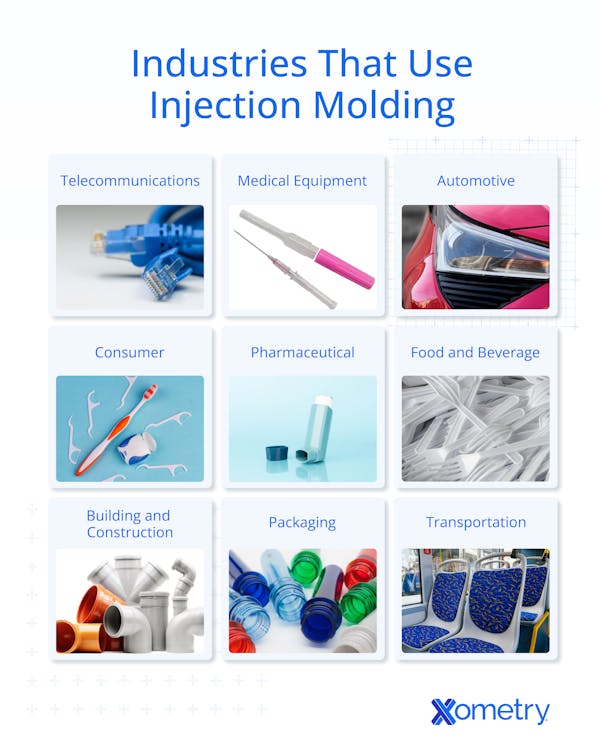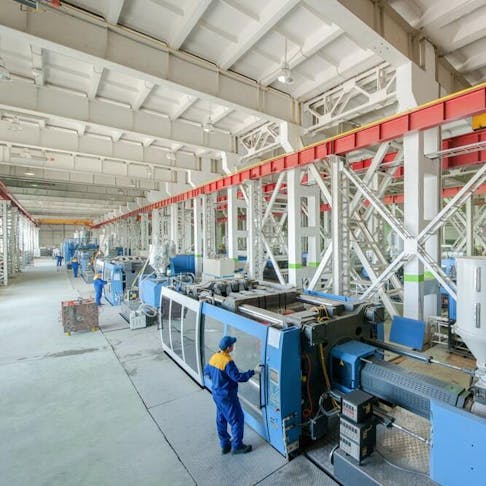The use of plastic injection molding is widespread for several reasons. Injection-molded products can be produced in high volumes, at low cost, and using a range of plastic materials. The process enables high production volumes at relatively low unit cost, making it widely used across many industries. These benefits are made possible by modern industrial injection molding machines that integrate feeding, melting, injection, and ejection functions. This article will focus on nine of the most common industries in which injection-molded parts are used and describe their use cases and advantages.

1. Telecommunications
The telecommunications industry comprises companies that facilitate communications through technological means. This industry can include companies that make cell phones, landlines, internet equipment, and telecommunications infrastructure such as cell towers and fiber optic cables. Some associated plastic injection-molded components include:
- Cell phone bodies and cases
- Wi-Fi router housings
- Cable connectors for LAN cables
Our interconnected society requires large volumes of telecom equipment. The high throughput of injection molding helps meet this demand. In addition, non-conductive and anti-static plastics can help protect sensitive electronics.
2. Medical Equipment
The medical industry requires a lot of specialized equipment. Healthcare professionals administer medical treatment using purpose-built devices that meet stringent guidelines. Examples of injection molding applications in the medical industry are listed below:
- Test swabs
- Select implant components
- Prosthetic parts
A key advantage is that production can be quickly scaled to meet surges in healthcare demand. The need for COVID-19 test kits made it clear that demand can skyrocket in a hurry.
3. Automotive
Modern automakers produce large numbers of plastic parts, each with tight tolerances. Vehicles incorporate extensive plastic trim, with additional polymer components under the hood and in the cabin. The automotive industry is one of the primary industries using plastic injection molding. Typical applications of injection molding in the automotive industry are listed below:
- Bumpers
- Headlights
- Hose fittings
- Door handles
- Dashboard buttons and switches
Beyond cost, a key advantage is reduced mass since plastic components are lightweight. This can contribute to improved fuel efficiency. In addition, injection-molded parts can have excellent surface finishes, making them ideal for cosmetic components. Furthermore, these plastic injection-molded components are durable and will not rust like metallic parts.
FREE Injection Molding Design Guide
4. Consumer Products
The consumer products industry manufactures a wide array of items that span entertainment, convenience, and hygiene. Each one has a specific function. Typical examples of injection-molded plastic consumer products include:
- Kitchen appliances
- Furniture
- Toothbrushes
- Toys
- Wall decorations
Injection molding enables complex geometries and can achieve mirror-like surface finishes. These are important factors that help improve the desirability of consumer products.
5. Pharmaceutical
The pharmaceutical industry develops and manufactures medications. Those medications often need plastic accessories such as:
- Drug-delivery devices
- Laboratory tubes and beakers
- Packaging for solid oral dosage forms
Injection-molded parts can be produced from biocompatible plastics with high inter-part consistency. This consistency is important due to the high levels of precision required by pharmaceutical devices. In addition, injection molding can produce small, complex parts for drug-releasing implants.
6. Food and Beverage
The food and beverage industry is focused on safely delivering food and drinks to customers. Food-safe plastic injection molded parts make convenient containers and utensils. They help prevent cross-contamination during transport and offer simple solutions for takeout restaurants. Below are some examples of food-related applications:
- Utensils
- Container caps and lids
- Food storage containers
Properly specified plastics are generally non-reactive with foods and support hygienic handling. In addition, many injection-grade plastics are approved for food contact by international standards bodies.
7. Building and Construction
The construction industry is an umbrella term for businesses that build, maintain, and repair structures. The structures themselves may range from individual houses to huge dams. While concrete is by far the most heavily used construction material, plastic products serve important supporting roles. Some typical injection molding applications within the building and construction industry include:
- Window and door hardware
- Construction tools
- Pipe and electrical fittings
When recycled plastics are incorporated into injection-molded parts, such as roof tiles or concrete fillers, injection-molded parts can offer insulation and support sustainability goals. Products made by injection molding are also robust and can easily last the lifespan of the structure.
8. Packaging
Disposable packaging makes use of both injection molding and injection blow molding. Injection molding is well-suited to manufacturing thin-walled packaging. Examples of applications are:
- Food packaging containers
- Consumer product packaging
- Bottle blanks
Thin-walled packaging is a lightweight method of protecting consumer products or foodstuffs from damage or contamination. Packaging walls are often less than 1 mm thick and can be effective barriers to contamination.
9. Transportation
The transportation industry is primarily concerned with conveying large quantities of raw materials through rail, air, or sea. Mass public transportation also falls under the umbrella of the transportation industry. Typical applications of injection molded products in transportation can include:
- Train seats
- Train fairings
- Overhead baggage containers
As in the automotive sector, using plastics to reduce component weight can contribute to fuel savings. This effect is compounded when vehicles travel long distances.
How Is Plastic Injection Molding Used Across Industries?
Plastic injection molding is primarily used for high-volume production. It is generally most cost-effective at higher volumes, often starting around several thousand to tens of thousands of units. As such, this process is ideal for industries with large customer bases. It can scale easily and produce parts inexpensively with very little waste.
What Are the Advantages of Plastic Injection Molding?
The advantages of plastic injection molding include:
- Low unit cost at scale
- Wide selection of available plastic materials for injection molding
- High rate of production
- Consistency throughout the production run
- Low energy consumption per item at scale
For more information, see our article on the advantages of plastic injection molding.
What Do Injection Molding Companies Do?
Injection molding companies can manufacture a wide range of components from many plastic materials. Some specialize in small components such as medical device parts, while others focus on large items such as car bumpers. The diversity of the process’s capability explains why so many industries use plastic injection molding. Many injection molding companies will also help you understand their DFM (Design for Manufacturing) guidelines for injection molded parts. These guidelines help ensure part quality and keep mold costs in check. In addition, leading injection molding companies handle mold maintenance to preserve quality and reduce total mold cost over its service life.
Summary
This article provided a look at the use of plastic injection molding across different industries, as well as examples of the types of products that are produced and the advantages of the process.
Xometry offers a full range of injection molding capabilities to help with your production needs. Visit our website to explore the full range of our capabilities or to request a free, no-obligation quote.
Disclaimer
The content appearing on this webpage is for informational purposes only. Xometry makes no representation or warranty of any kind, be it expressed or implied, as to the accuracy, completeness, or validity of the information. Any performance parameters, geometric tolerances, specific design features, quality and types of materials, or processes should not be inferred to represent what will be delivered by third-party suppliers or manufacturers through Xometry’s network. Buyers seeking quotes for parts are responsible for defining the specific requirements for those parts. Please refer to our terms and conditions for more information.


